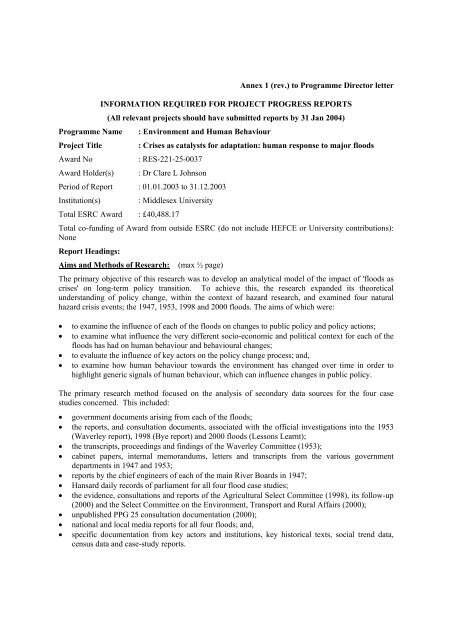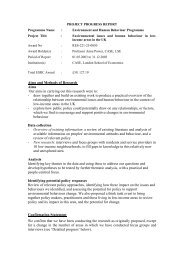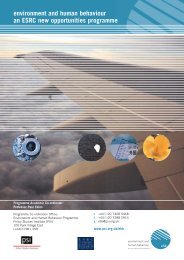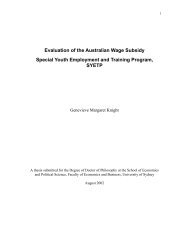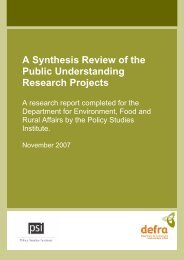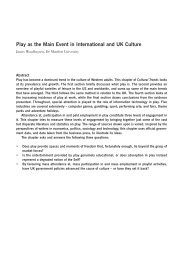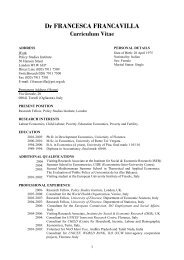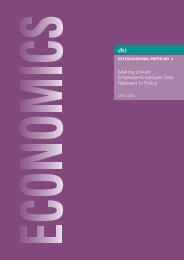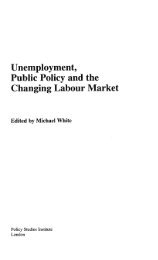Annual progress report - 2003 (pdf format) - Policy Studies Institute
Annual progress report - 2003 (pdf format) - Policy Studies Institute
Annual progress report - 2003 (pdf format) - Policy Studies Institute
Create successful ePaper yourself
Turn your PDF publications into a flip-book with our unique Google optimized e-Paper software.
Annex 1 (rev.) to Programme Director letter<br />
INFORMATION REQUIRED FOR PROJECT PROGRESS REPORTS<br />
(All relevant projects should have submitted <strong>report</strong>s by 31 Jan 2004)<br />
Programme Name : Environment and Human Behaviour<br />
Project Title : Crises as catalysts for adaptation: human response to major floods<br />
Award No<br />
: RES-221-25-0037<br />
Award Holder(s) : Dr Clare L Johnson<br />
Period of Report : 01.01.<strong>2003</strong> to 31.12.<strong>2003</strong><br />
Institution(s) : Middlesex University<br />
Total ESRC Award : £40,488.17<br />
Total co-funding of Award from outside ESRC (do not include HEFCE or University contributions):<br />
None<br />
Report Headings:<br />
Aims and Methods of Research: (max ½ page)<br />
The primary objective of this research was to develop an analytical model of the impact of 'floods as<br />
crises' on long-term policy transition. To achieve this, the research expanded its theoretical<br />
understanding of policy change, within the context of hazard research, and examined four natural<br />
hazard crisis events; the 1947, 1953, 1998 and 2000 floods. The aims of which were:<br />
• to examine the influence of each of the floods on changes to public policy and policy actions;<br />
• to examine what influence the very different socio-economic and political context for each of the<br />
floods has had on human behaviour and behavioural changes;<br />
• to evaluate the influence of key actors on the policy change process; and,<br />
• to examine how human behaviour towards the environment has changed over time in order to<br />
highlight generic signals of human behaviour, which can influence changes in public policy.<br />
The primary research method focused on the analysis of secondary data sources for the four case<br />
studies concerned. This included:<br />
• government documents arising from each of the floods;<br />
• the <strong>report</strong>s, and consultation documents, associated with the official investigations into the 1953<br />
(Waverley <strong>report</strong>), 1998 (Bye <strong>report</strong>) and 2000 floods (Lessons Learnt);<br />
• the transcripts, proceedings and findings of the Waverley Committee (1953);<br />
• cabinet papers, internal memorandums, letters and transcripts from the various government<br />
departments in 1947 and 1953;<br />
• <strong>report</strong>s by the chief engineers of each of the main River Boards in 1947;<br />
• Hansard daily records of parliament for all four flood case studies;<br />
• the evidence, consultations and <strong>report</strong>s of the Agricultural Select Committee (1998), its follow-up<br />
(2000) and the Select Committee on the Environment, Transport and Rural Affairs (2000);<br />
• unpublished PPG 25 consultation documentation (2000);<br />
• national and local media <strong>report</strong>s for all four floods; and,<br />
• specific documentation from key actors and institutions, key historical texts, social trend data,<br />
census data and case-study <strong>report</strong>s.
In addition, as of the end of December, seven semi-structured interviews have been conducted with<br />
key actors involved in the 1953, 1998 and 2000 floods. These informants were either centrally<br />
involved in the policy negotiation process or known to be knowledgeable of the flood hazard context,<br />
policy changes and/or the policy negotiations that occurred. No such actor was available for the 1947<br />
flood.<br />
Confirmation Statement: (one paragraph confirming that research is being conducted as<br />
anticipated in the initial contract with ESRC or as subsequently<br />
agreed)<br />
I can confirm that the research has been conducted in accordance with contract. Where this has<br />
deviated slightly is in the theoretical developments associated with the project. By including a broad<br />
theoretical understanding of the public policy and policy change literature, this has greatly enhanced<br />
our understanding of the relationship between 'floods as crises' and changing policy. The actororiented<br />
literature, which formed part of the original proposal, would not have been appropriate in this<br />
context.<br />
Highlights of the Research<br />
and Important Findings: (max 1 page, referring to period of the <strong>report</strong>)<br />
Research highlight: The impact of flood crises on long-term policy transition<br />
The tied relationship between major floods and the demand by the public for a policy response is well<br />
known (Parker, 2000; Tobin and Montz, 1997). However, what is not well known, is how and why<br />
particular policy ideas emerge as policy change during certain contexts and crises, whilst others<br />
remain in the 'policy-option pool'. By combining the extensive and applied research history in the<br />
flood hazard and public policy research domains, with the detailed analysis of four case studies, this<br />
project has augmented our theoretical understanding of the policy process in the flood hazard context.<br />
The highlight of which is the fulfilment of the project objective: the development of a new analytical<br />
model exploring the impact of flood crises on long-term policy transition.<br />
As with all modelled relationships this is a simplification of the complex relationships between human<br />
behaviour and the environment. However, based on the theoretical insights gained in this project, and<br />
the case studies evaluated, the model is thought to be an important contribution to our understanding<br />
of the relationships between key behavioural, contextual and environmental factors which, in<br />
combination, influence policy as a result of crises. In this way, recognising the interaction between<br />
these variables, and the dominance of certain relationships and variables over others, it offers the<br />
potential to provide insight into, or signals of, the kinds of policy changes which might occur as a<br />
result of future crises.<br />
Important findings<br />
Aim 1: The influence of major floods on changes in public policy<br />
All four of the floods investigated resulted in changes in policy towards the flood hazard. However, in<br />
all but one example, (the Storm Tide Warning System that emerged from the 1953 flood), these<br />
changes did not reflect any 'new' policy ideas or fundamental changes in policy direction. Rather, the<br />
floods served to act as a catalyst for increasing the rate at which a policy idea, already under<br />
consideration prior to the flood, was given prominence and acted upon. In addition, our findings<br />
suggest that it is not just the major floods investigated that have acted as catalysts for changing policy,<br />
some minor floods can also be seen to have been influential in changing policy.
Aim 2: Context as a key determinant in policy response as a result of major flooding<br />
Our findings provide further illustration of the importance of context in any evaluation of policy<br />
responses as a result of crisis events in three important ways. Firstly, we found that the availability of<br />
technology, in<strong>format</strong>ion, and knowledge at the time of each of the floods significantly influenced the<br />
policy ideas which existed for managing the flood risk. Secondly, the values, beliefs and attitudes of<br />
the dominant actors influenced which of the available policy ideas were engaged as policy change<br />
options in the agenda-setting process, although many other factors affected which were prioritised and<br />
implemented. Here, the distinction between incremental and catalytic policy change proved valuable:<br />
by understanding the incremental changes in policy, and the underlying values and beliefs that these<br />
represent, the historic developments in attitudes towards the flood hazard provided important<br />
contextual understanding of policy behaviour at times of crisis. Finally, the socio-economic,<br />
institutional and political context at the time of each flood was, unsurprisingly, found to be key<br />
contextual factors in determining policy response.<br />
Aim 3: The influence of key actors on the policy change process<br />
In each of the floods, two or three actors, not necessarily previously engaged in the flood policy<br />
domain, played prominent roles in ensuring that certain policy ideas dominated the agenda setting<br />
process. This did not, however, represent a radical shift in policy thinking. Rather, these individuals<br />
were able to develop their policy ideas within a receptive environment. Or, put another way, they were<br />
able to influence which policies were germinated from the policy seed-bed. In this way, our research<br />
has illustrated the importance of key actors for influencing which ideas become policy, but this can<br />
only be achieved where there is general consensus to these ideas in the first place.<br />
Aim 4: How human behaviour towards the environment has changed over time - generic signals of<br />
human behaviour and policy change.<br />
<strong>Policy</strong> towards the flood hazard in England and Wales has evolved both incrementally and<br />
catalytically over the past 50 years or so. Our research has highlighted the importance of<br />
understanding the incremental if we are to offer any understanding of potential changes in light of<br />
rapid climate change events. Key influencing factors in this process appear to be a combination of<br />
contextual (in<strong>format</strong>ion, knowledge, technology, social, political, economic), behavioural (values,<br />
attitudes, beliefs) and environmental drivers (scientific knowledge-base, extreme events). Within this<br />
complexity, seeking generic signals of change in any of these factors, which might lead to changing<br />
policy in the future, is a complex task indeed. However, by monitoring change in the drivers seen as<br />
so critical in the past, this can provide a more informed understanding of the ideas which, in the event<br />
of a crisis, might lead to changing policy in the future. For example, if changing knowledge about, and<br />
attitudes towards, technology resulted in incremental increases in the funding of flood warning<br />
technological research and development, this would be a 'signal' of potential changes in policy directed<br />
towards flood warnings, and flood warning technology in particular, in the event of a major flood.<br />
Changes to Original Award: (max ½ page, on any changes to the award holder(s), research<br />
staff or institution since the award commenced)<br />
No changes to <strong>report</strong><br />
Research Staff:<br />
(max ½ page with names, status and period of appointment and<br />
details of any research staff associated with this project not<br />
funded under the programme award)<br />
As set out in the original proposal, Professor Edmund Penning-Rowsell, Head of the Flood Hazard<br />
Research Centre, has been involved throughout the project in a non-funded capacity. This was in<br />
accordance with the original contract.
Publications:<br />
(list all publications from the research to date or in preparation,<br />
give author, editor, publisher and date)<br />
Johnson, C.L., Tunstall, S.M. and Penning-Rowsell, E.C. (<strong>2003</strong>) 'A model of incremental and catalytic<br />
policy change: from land drainage to flood risk management'. Flood Hazard Research Centre working<br />
paper, Middlesex University. (Note: to be developed for journal publication).<br />
Tunstall, S.M., Johnson, C.L., Penning-Rowsell, E.C. (2004) Flood hazard management in England<br />
and Wales: from land drainage to flood risk management. Paper accepted for presentation at the<br />
World Congress on Natural Disaster Mitigation, 19-21 February, New Dehli, India.<br />
Johnson, C.L. and Ekins, P. (<strong>2003</strong>) Theoretical approaches to policy change and human behaviour.<br />
ESRC Environment and Human Behaviour Inter-programme workshop <strong>report</strong>, 1st October, <strong>2003</strong>.<br />
(Note: to be made available on the programme website).<br />
Engagement with potential<br />
Research Users (outside the<br />
academic community):<br />
(max ½ page describing involvement of users in the research<br />
process and/or dissemination of outcomes with particular<br />
relevance to users, during the period of the <strong>report</strong>. Give specific<br />
examples and future plans you may have)<br />
The initial research design included a consultative advisory group consisting of two end-users and one<br />
academic. These individuals have been asked to comment on ideas developed and have all received<br />
the publications that have been produced to-date.<br />
The seven interviews so far completed have all been with influential end-users in the flood hazard<br />
policy domain, including local level action group representatives as well as individuals in formal<br />
institutions of governance such as the ODPM, Defra and the Environment Agency. This end-user<br />
involvement has been critical to the research process and it is our intention that all respondents will be<br />
provided with a summary of the research outcomes when available. This is in accordance with our<br />
proposal, which stated our intention to distribute 25 copies of the final <strong>report</strong> to the end-user<br />
community.<br />
A wide variety of end-users from Defra, the Environment Agency, Local Authority's, Local Flood<br />
Action Groups and Independent Consultants have been actively consulted about the project in an<br />
informal capacity at individual meetings and at three policy-related conferences attended by members<br />
of the research team. These include: 'The European North Sea Flood Conference - the 1953 floods and<br />
beyond'. Norwich, 30th January, <strong>2003</strong>; 'The Big Flood: North Sea Storm Surges. The Royal Society,<br />
London. 23 May, <strong>2003</strong>; 'European Flooding: Managing the risks'. CIWEM conference, June 17th-<br />
18th, <strong>2003</strong>.<br />
We have already presented preliminary findings to the Royal Geographical Society <strong>Annual</strong><br />
Conference (September, <strong>2003</strong>), we have plans to present further results to a range of end-users and<br />
academics at the forthcoming World Congress on Natural Disaster Mitigation in India (February,<br />
2004), and to staff at HR Wallingford in April 2004. Where appropriate, we also intend to disseminate<br />
the research findings at user-oriented conferences and meetings, such as those organised by CIWEM<br />
and Defra.
Contribution to Programme<br />
(max 1 page)<br />
Principal cross-programme contribution: The most significant cross-programme initiative we<br />
instigated was the organising and running of a workshop in October, <strong>2003</strong> entitled: Theoretical<br />
Approaches to <strong>Policy</strong> Change and Human Behaviour. The rationale for which was to highlight the<br />
frameworks, models and theories being employed by the various projects in an attempt to gain insight<br />
into the links between human behaviour and environmental change. Based on the presentations and<br />
discussions that ensued, it was clear that no single theoretical perspective would satisfy the diversity of<br />
projects and perspectives. Instead, Dr Johnson developed a framework which set out the main factors,<br />
in three realms, that seem critical to understanding the environment-human behaviour relationship<br />
(Johnson & Ekins, <strong>2003</strong>, Figure 2). This model has, in turn, been used to help frame the contributions<br />
and insights from all 15 projects. For as Johnson & Ekins state: 'The hope will be that this map will<br />
allow conclusions, however tentative, to be drawn about the kinds of interventions that may be<br />
required for particular kinds of changes to take place (Johnson and Ekins, <strong>2003</strong>:17).<br />
Project contribution to generic programme research questions:<br />
Why do people behave as they do towards the natural environment? Our research highlights the<br />
significance of pre-flood contexts in determining the 'type' of policy responses available, and their<br />
political acceptability, at times of major floods. It also illustrates the significance of the scientific<br />
knowledge base and technological context as key determinants in the range of policy ideas that may be<br />
available to decision-makers in response to such floods. Similarly, it illustrates the influence of key<br />
actors in prioritising which of the policy ideas in the 'policy option-pool' to germinate and which<br />
remain in the 'seed-bed'. In short, therefore, our research suggests that people behave as they do<br />
towards the natural environment due to a complex inter-relationship between environmental,<br />
contextual and behavioural factors which are historically embedded, constantly changing (even if only<br />
incrementally), and liable to change at times of environmental crises - in our case a major flood.<br />
How will people seek to adapt their behaviour in response to environmental change? In each of the<br />
case studies investigated, the key actors were not found to significantly alter their behaviour during, or<br />
in the immediate aftermath, of the flood. However, when looked at from a longer time horizon, each<br />
of the case studies provided evidence of changing policy as a direct consequence of the flood.<br />
Therefore, recognising the political unacceptability of inaction, due in no small part to the role of the<br />
media, MPs and other actors previously disengaged from the policy discourse, major floods will result<br />
in a change in public policy behaviour. In this sense, adaptation will always be reactive to<br />
environmental change. However, in all but one example, this adaptation was not a 'new' idea but<br />
merely an increase in the rate of policy change, and in some cases the toughening of policy guidance.<br />
Hence, the flood acted as a catalyst for speeding-up, and informing, a policy change process based on<br />
ideas already in existence prior to the flood. Thus, we can tentatively conclude that a rapid<br />
environmental change event forces people to address policy needs but any changes to this policy tend<br />
to be based on prior knowledge and ideas.<br />
What policy approaches might persuade people to change their behaviour? This question was not<br />
directly addressed in our research. However, where policy options in the past have sought to protect<br />
people from flooding this has encouraged development in floodplains and caused surprise, and anger,<br />
when this protection has failed. Within the modern climate of flood risk management, a more multidimensional<br />
approach to managing the flood risk is now envisaged. To change behaviour, people need<br />
to be aware of the risk and aware of the options available for managing this risk. Therefore, an<br />
indirect result of our research is the illustration of the importance of policies which raise public<br />
awareness. Without this basic awareness there is unlikely to be positive changes in people's behaviour<br />
towards the flood hazard. However, finding which adaptations that are likely to be successful is as<br />
much about understanding behaviour as it is about policy persuasion.
Detailed Progress:<br />
(max 1 page to cover:<br />
(i) brief résumé of the development of the research since the<br />
start of the award<br />
(ii) if this is not the first <strong>progress</strong> <strong>report</strong>, main developments<br />
since the last <strong>report</strong><br />
(iii) any difficulties encountered e.g. in staffing, access, data<br />
analysis<br />
(iv) changes introduced or envisaged in the research objectives<br />
or methodology<br />
(v) an estimate of how far the original timetable will be met).<br />
(i) Brief résumé<br />
The initial research design drew heavily on the theoretical underpinnings of actor-oriented research<br />
when applied to the hazard field. This guided the development of a hazard-response model of policy<br />
negotiation as an adaptation of the contextual decision model produced by Penning-Rowsell (1996).<br />
As the project developed, it soon became clear that this design failed to offer insight in two important<br />
ways.<br />
Firstly, the original design did not adequately address why and how actor negotiation resulted in<br />
changes to policy. Therefore, alongside the need to undertake case study research, which directly<br />
contributed to the key aims and objectives of the research, it was clear that an understanding of the<br />
public policy and policy change literature was required. A broad literature base was consulted<br />
resulting in an important concept paper which specifically addressed the impact of crises on changing<br />
policy (Johnson et al, <strong>2003</strong>). Central to this theoretical insight was the development of a 'new'<br />
theoretical model of incremental and catalytic change (Johnson et al, <strong>2003</strong>).<br />
Having incorporated this 'new' model into the case study evaluation, this meant that the proposed<br />
actor-analysis, which focused on changes in individual actor behaviour prior to, during, and<br />
immediately following a major flood, would no longer be appropriate. Instead, analysis centred on the<br />
way in which the underlying beliefs, values and attitudes of the dominant coalition of actors, in each<br />
context, enabled certain ideas to dominate the policy agenda process. Therefore, rather than seeking to<br />
evaluate changing attitudes and perceptions of all stakeholders, only those key actors regarded as<br />
critical to the policy change process were evaluated.<br />
Secondly, the original research design did not adequately address the underlying changes to flood<br />
policy over the fifty-year period in which our four case studies were located. As the case study<br />
analysis unfolded it soon became clear that to understand each flood in context, such a broad<br />
understanding of policy change, as incremental change, would be necessary. Whilst a detailed<br />
analysis of all the possible influences on this incremental change, and their causes, was beyond the<br />
remit of our project, a basic understanding of the change in values, beliefs and attitudes towards the<br />
flood hazard over time was conducted (Tunstall et al, <strong>2003</strong>)<br />
As it currently stands, all of the secondary data analysis has been completed along with seven of the<br />
ten interviews proposed. It is our intention to conduct the final three interviews within the next three<br />
to four weeks. We are in the process of writing the final <strong>report</strong>, which will accompany the ESRC end<br />
of award <strong>report</strong>. There is no reason, at present, to assume that this will not be completed on time (due<br />
31-03-04).
(ii) Main developments since last <strong>report</strong>. Not applicable<br />
(iii) Difficulties encountered: None<br />
(iv) Changes to objectives or methodology: The developments in our theoretical understanding have<br />
resulted in one change to our original research design; although this has not affected our objectives or<br />
the methods used. In our proposal we said we would provide a human behaviour timeline for seven<br />
sets of actors covering the period immediately before, during, and after each flood. This was<br />
attempted but these actors rarely changed their position in the timeframe investigated. Therefore, only<br />
those individual actors regarded as 'key policy entrepreneurs' were analysed in any detail in each case<br />
study. This was in part because a detailed human behaviour timeline with clear causal links to the<br />
flood was not plausible and in part because such an analysis was not in keeping with our theoretical<br />
developments.<br />
(v) Timetable: We have three interviews still to complete and the final <strong>report</strong> to write. This is<br />
expected to be completed by the end of February.


